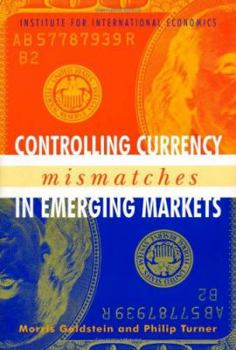Controlling Currency Mismatches in Emerging Markets
In most of the currency crises of the 1990s, the largest output falls have occurred in those emerging economies with large currency mismatches, a phenomenon that occurs when assets and liabilities are denominated in different currencies such that net worth is sensitive to changes in the exchange rate. Currency mismatching makes crisis management much more difficult since it constrains the willingness of the monetary authority to reduce interest rates in a recession (for fear of initiating a large fall in the currency that would bring with it large-scale insolvencies). The mismatching also produces a "fear of floating" on the part of emerging economies, sometimes inducing them to make currency-regime choices that are not in their own long-term interest. Morris Goldstein and Philip Turner summarize what is known about the origins of currency mismatching in emerging economies, discuss how best to define and measure currency mismatching, and review policy options for reducing the size of the problem.
Format:Paperback
Language:English
ISBN:0881323608
ISBN13:9780881323603
Release Date:April 2004
Publisher:Peterson Institute for International Economic
Length:192 Pages
Weight:0.60 lbs.
Dimensions:0.4" x 6.1" x 9.0"
Grade Range:Postsecondary and higher
Customer Reviews
1 rating
Strongly recommended reading for policy makers
Published by Thriftbooks.com User , 21 years ago
In Controlling Currency Mismatches In Emerging Markets, Morris Goldstein (Dennis Weatherstone Senior Fellow at IIE) and Philip Turner (Head of the Secretariat Group in the Monetary and Economics Department, Bank for International Settlements) collaborate in revealing and dealing with past and present weaknesses in economic policies and institutions in contemporary and emerging markets around the globe. But more than a simply litany of flawed policies and economic ills, the authors present an effective and practical plan of action to control currency mismatches through a managed floating currency regime, an inflation targeting regime for monetary policy, regular publication of data on currency mismatches at the sectoral and economy wide levels, stepped up supervision and monitoring of currency mismatches in banks and in the loan customers, changes in official safety nets and in IMF policy conditionality, implementation of more prudent debt and reserve management policies in emerging economies, and a higher priority with respect to developing domestic bond markets, hedging instruments, and reduced barriers respecting foreign-owned banks within emerging economies. Informed and informative, Controlling Currency Mismatches In Emerging Markets is a sold work of seminal research and strongly recommended reading for policy makers with respect to international economic issues.





